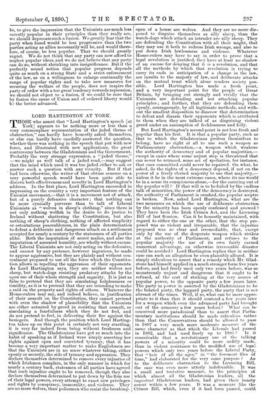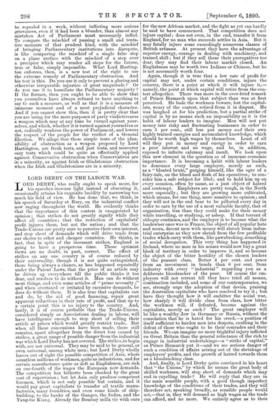LORD HARTINGTON AT YORK. T HOSE who assert that " Lord
Hartington's speech [at York] appears to be nothing more or less than a very commonplace representation of the jaded theme of obstruction," can hardly have honestly asked themselves, or else can hardly have candidly answered the question, whether there was nothing in the speech that put with new force, and illustrated with new applications, the great controversy between the Gladstonians and the Government. Probably the very strange expression, a " jaded theme," —we might as well talk of a jaded road,—may suggest that the mind which used it was too jaded either to ask or answer such a question with any vivacity. But if that had been otherwise, the writer of that obtuse censure on a very powerful speech would have been quite able to discern both effectiveness and novelty in Lord Hartington's address. In the first place, Lord Hartington succeeded in impressing on the country a very important feature of the Unionist movement,—that it is a movement not of attack, but of a purely defensive character ; that nothing can be more cynically perverse than to talk of Liberal Unionists as " wolves in sheep's clothing," since there is not only nothing wolfish in the desire to do justice to Ireland without shattering the Constitution, but also nothing of sheep's clothing, nothing of affected simplicity or ostentatious peaceableness, in the plain determination to defeat a deliberate and dangerous attack on a settlement accepted for nearly a century by the statesmen of all parties alike. Both the imputation of secret malice, and also the imputation of assumed humility, are wholly without excuse. The Liberal Unionists are not only acting on the defensive, and cannot by any pretence, however ingenious, be made to appear aggressive, but they are plainly and without con- cealment prepared to use all the force which the Constitu- tion allows in repelling the aggression of their opponents. As Lord Hartington says, they are neither wolves nor sheep, but watch-dogs resisting predatory attacks by the open use of their whole strength and sagacity. It is just as false to pretend that they are simulating helplessness or timidity, as it is to pretend that they are intending to make a raid on the property and rights of others. Whatever the Home-rulers may say, and indeed believe, in justification of their assault on the Constitution, they cannot pretend with even the shadow of plausibility that the Unionists are either actuated by greed in resisting that assault, or simulating a fearfulness which they do not feel, and do not pretend to feel, in delivering their fire against the besiegers. And though the position which Lord Harting- ton takes up on this point is certainly not very startling, it is very far indeed from being without freshness and significance. The Gladstonians have got so much into the habit of speaking as if Ireland were simply asserting her rights against open and convicted tyranny, that it has become a very important matter to make Englishmen see that the Unionists are in no sense whatever taking, either openly or secretly, the side of tyranny and oppression. They declare themselves determined to remove every injustice of which Irishmen complain, in the only manner in which for nearly a century back, statesmen of all parties have agreed that such injustice ought to be removed, though they also declare themselves determined to put down by the firm use of their legal powers, every attempt to exact new privileges and rights by conspiracy, immorality, and violence. They are no more wolves, than policemen who resist the breaking- open of a, house are wolves. And they are no more dis- posed to disguise themselves as silly sheep, than the watch-dogs which attack an intruder are silly sheep. They are defending the Constitution with all their might, that they may use it both to redress Irish wrongs, and also to put down Irish lawlessness and violence. Whatever Home-rulers may have to say in order to prove that a legal revolution is justified, they have at least no shadow of an excuse for denying that it is a revolution, and that all the methods by which that revolution is trying to carry its ends in anticipation of a change in the law, are insults to the majesty of law, and deliberate attacks on the mutual trust which alone renders society pos- sible. Lord Hartington has made a fresh point, and a very important point for the people of Great Britain, by bringing out strongly and vividly that the- Unionists are defending and not attacking popular principles ; and further, that they are defending them. openly, courageously, by all legitimate methods, and with-- out the smallest disposition to disavow that determination to defeat and disarm their opponents which is attributed to them when they are talked of as disguising violent. greed under an assumption of fecklessness and folly.
But Lord Hartington's second point is not less fresh and popular than his first. It is that a popular party, such as that to which the Gladstonians profess themselves to belong, have no right at all to use such a weapon as Parliamentary obstructiou,—a weapon which weakens the authority of democracy and of popular majorities,— except in cases where some unjust step is threatened that can never be retraced, some act of spoliation, for instance, that once committed could never be repaired. On what, he asked, do the rights of a democracy depend, if not on the power of a freely elected majority to use that majority,— unless it be in the most extreme cases, where its use would be in a sense its conspicuous abuse,—for the carrying out of the popular will ? If that will is to be foiled by the endless talk of minorities, the power of the democracy is destroyed, the authority of Parliament is crushed, the popular sceptre is broken. Now, asked Lord Hartington, what are the two measures on which the use of deliberate obstruction. by the minority has been openly confessed and avowed ?- They have been the Irish Crimes Act, and the Licensing Bill of last Session. Can it be honestly maintained, with regard to either the one or the other, that the step pro- posed was so violent and irreparable, that the injustice proposed was so clear and irremediable, that, except only by the use of the desperate weapon which strikes at the authority of Parliament, and refuses to the popular majority the use of its own fairly earned• numerical advantage, an otherwise irrevocable disaster could be avoided ? Lord Hartington replies that in neither case can such an allegation be even plausibly alleged. It is simply ridiculous to assert that a remedy which Mr. Glad- stone had himself applied in a much stronger form five years before, and had freely used only two years before, was so monstrously unjust and dangerous that it ought to be refused, at the cost of striking at the very source of popular power, to the opposite party a few years later. The party in power is asserted by the Gladstonians to be the belated party, the laggard party, the party that is not- abreast of the times. Well, if so, what can be more appro- priate to it than that it should contend a few years later for a weapon which even the advanced party had brought out of the armoury a few years before ? What can be conceived more paradoxical than to assert that Parlia- mentary institutions should be made ridiculous rather than that the Conservatives should be allowed to pass in 1887 a very much more moderate measure of the same character as that which the Liberals had passed in 1882, and had used freely up to 1885 ? Is it conceivable that a revolutionary use of the talking powers of a minority could be more unfitly made,. than in violent resistance to the modified use of legal, powers which only two years before the Liberal Party,. that " heir of all the ages," in " the foremost files of time," had elaborated for the very same purpose ? As to the deliberate obstruction to the Licensing Bill, the case was even more utterly indefensible. It was a small and tentative measure, to the principles of which almost all the Gladstonian leaders, all the important Gladstonian leaders, had given their hearty assent within a few years. It was a measure like the Crimes Bill, which, even if it had been passed, could. be repealed in a week, without inflicting more serious grievances, even if it had been a blunder, than almost any mistaken Act of Parliament must necessarily inflict. To compare the mischief of passing a small and tenta- tive measure of that prudent kind, with the mischief of bringing Parliamentary institutions into disrepute, is like comparing the mischief of a single false step on a plane surface with the mischief of a step over a precipice which may render all steps for the future, true or false, simply impossible. What Lord Harting- ton enforces, then, is a new test of the right to use the extreme remedy of Parliamentary obstruction. And his test is this. Do you use it only to prevent a glaring and otherwise irreparable injustice of great magnitude ? Or do you use it to humiliate the Parliamentary majority ? If the former, then you ought to be able to show that you yourselves have always refused to have anything to say to such a measure, as well as that it is a measure of immense moment and of a most prejudicial character. And if you cannot show this, then it is pretty clear that you are using for the mere purposes of party vindictiveness a weapon which may at any time be turned against your- selves, and which, whether it is turned against yourselves or not, radically weakens the power of Parliament, and lowers the respect of the people for the verdict of a General Election. We allege that these simple tests of the plau- sibility of obstruction as a weapon proposed by Lord Hartington, are fresh tests, and just tests, and moreover easy tests which could be quite as effectually applied against Conservative obstruction when Conservatives are in a minority, as against Irish or Gladatonian obstruction when the Irish and Gladstonians are in a minority.



































 Previous page
Previous page